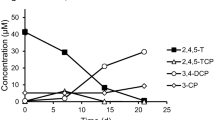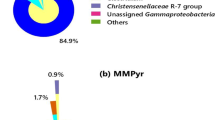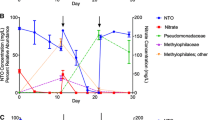Abstract
The capability of nitrate-reducing bacteria to degrade alkyltoluenes in the absence of molecular oxygen was investigated with the three isomers of xylene, ethyltoluene, and isopropyltoluene (cymene) in enrichment cultures inoculated with freshwater mud. Denitrifying enrichment cultures developed most readily (within 4 weeks) with p-cymene, a natural aromatic hydrocarbon occurring in plants, and with m-xylene (within 6 weeks). Enrichment of denitrifiers that utilized m-ethyltoluene and p-ethyltoluene was slow (within 8 and 12 weeks, respectively); no enrichment cultures were obtained with the other alkylbenzenes within 6 months. Anaerobic degradation of p-cymene, which has not been reported before, was studied in more detail. Two new types of denitrifying bacteria with oval cells, strains pCyN1 and pCyN2, were isolated; they grew on p-cymene (diluted in an inert carrier phase) and nitrate with doubling times of 12 and 16 h, respectively. Strain pCyN1, but not strain pCyN2, also utilized p-ethyltoluene and toluene. Both strains grew with some alkenoic monoterpenes structurally related to p-cymene, e.g., α-terpinene. In addition, the isolates utilized p-isopropylbenzoate, and mono- and dicarboxylic aliphatic acids. Determination of the degradation balance of p-cymene and growth with acetate and nitrate indicated the capacity for complete oxidation of organic substrates under anoxic conditions. Adaptation studies with cells of strain pCyN1 suggest the existence of at least two enzyme systems for anaerobic alkylbenzene utilization, one metabolizing p-cymene and p-ethyltoluene, and the other metabolizing toluene. Excretion of p-isopropylbenzoate during growth on p-cymene indicated that the methyl group is the site of initial enzymatic attack. Although both strains were facultatively aerobic, as revealed by growth on acetate under air, growth on p-cymene under oxic conditions was observed only with strain pCyN1. Strains pCyN1 and pCyN2 are closely related to members of the Azoarcus-Thauera cluster within the β-subclass of the Proteobacteria, as revealed by 16S rRNA gene sequence analysis. This cluster encompasses several described denitrifiers that oxidize toluene and other alkylbenzenes.
Similar content being viewed by others
Author information
Authors and Affiliations
Additional information
Received: 15 July 1998 / Revision received: 29 July 1999 / Accepted: 2 August 1999
Rights and permissions
About this article
Cite this article
Harms, G., Rabus, R. & Widdel, F. Anaerobic oxidation of the aromatic plant hydrocarbon p-cymene by newly isolated denitrifying bacteria. Arch Microbiol 172, 303–312 (1999). https://doi.org/10.1007/s002030050784
Issue Date:
DOI: https://doi.org/10.1007/s002030050784




